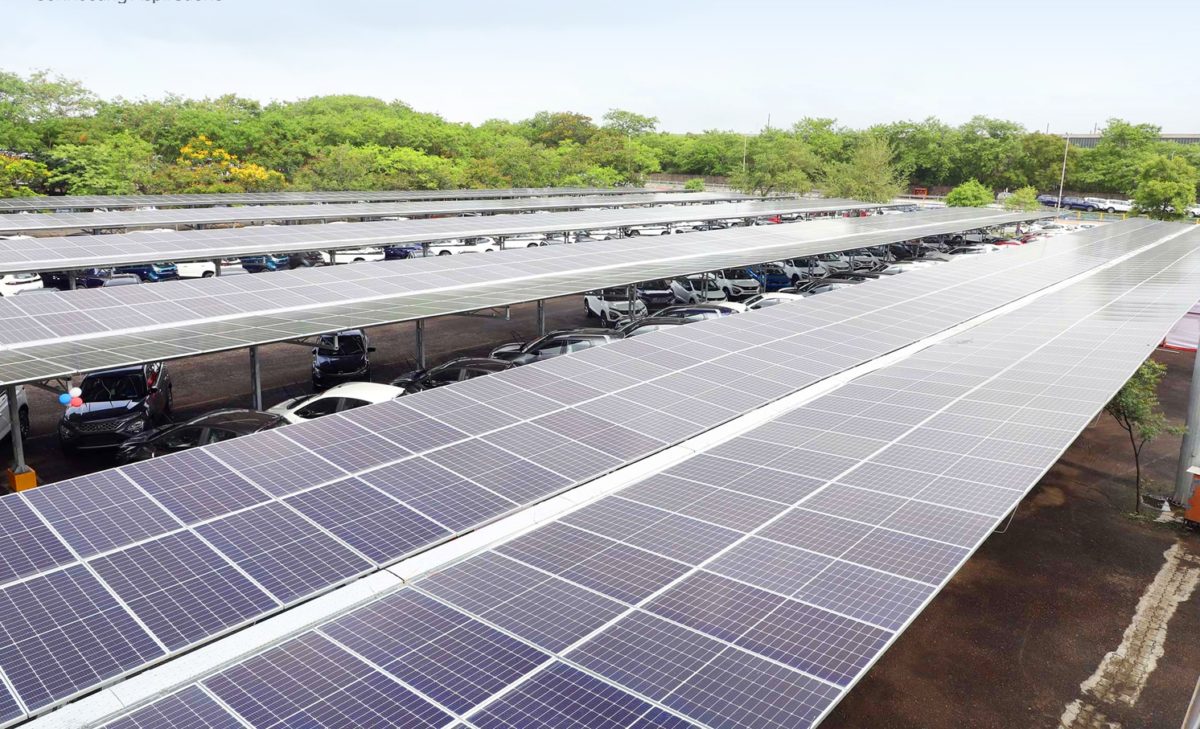From pv magazine India
Indian energy company Tata Power today announced the commissioning of India’s largest grid-synchronized, behind-the-meter solar carport at the Tata Motors plant in Chikhali, Pune, in the Indian state of Maharashtra.
The 6.2 MWp solar carport is estimated to reduce 7,000 tons of carbon emissions annually and 160,000 tons over its lifecycle. Spanning over 30,000 square meters, the carport will generate green power and provide covered parking for finished cars in the plant.
Tata Motors envisioned the plant as part of its net-zero carbon goal for 2039. It entered into a power purchase agreement (PPA) with Tata Power in August last year. Despite the challenges brought by Covid-19, both companies successfully managed to develop this massive carport infrastructure in a record time of nine and a half months.
“We have always been conscious of the need to conserve energy and are committed to achieving 100% renewable energy source for all our operations,” said Shailesh Chandra, president of Tata Motors' passenger vehicle business unit. “Our partnership with Tata Power to deploy India’s largest solar carport at our car plant in Pune is a step in that direction.”
Tata Power CEO Praveer Sinha added, “As One Tata initiative, we are proud to partner with Tata Motors and inaugurate India’s largest solar carport. Our partnership is a testament to our collective efforts to lower the carbon footprint and provide innovative and future-focused green energy solutions. We will continue to explore new ways to harness clean resources and offer them to our partners and customers.”
Being a signatory of the RE100, Tata Motors is committed to using 100% renewable power and has taken several strides towards achieving this goal by progressively increasing the proportion of renewable energy used in its operations. In FY 2020, the company generated 88.71 million kWh of renewable electricity, which is over 21% of its total power consumption (up from 16% in FY 2019). This helped prevent the equivalent of 72,739 metric tons of carbon dioxide (CO2) emissions. The company further intends to source renewable energy more rigorously to meet its aspiration of sourcing 100% renewable energy by 2030.
Tata Power has executed multiple large solar solutions, including the world’s largest rooftop solar plant (16 MW) at a single location at Radhasoami Satsang Beas in Amritsar; 2.67 MW at Cochin International Airport; the world’s largest solar-powered cricket stadium for the Cricket Club of India (CCI), with 820.8 kWp capacity; a unique vertical solar farm (120 kW) for Dell Technologies in Bangalore; and a 1.4 MW floating solar project at Tata Chemicals in Nellore.
This content is protected by copyright and may not be reused. If you want to cooperate with us and would like to reuse some of our content, please contact: editors@pv-magazine.com.




By submitting this form you agree to pv magazine using your data for the purposes of publishing your comment.
Your personal data will only be disclosed or otherwise transmitted to third parties for the purposes of spam filtering or if this is necessary for technical maintenance of the website. Any other transfer to third parties will not take place unless this is justified on the basis of applicable data protection regulations or if pv magazine is legally obliged to do so.
You may revoke this consent at any time with effect for the future, in which case your personal data will be deleted immediately. Otherwise, your data will be deleted if pv magazine has processed your request or the purpose of data storage is fulfilled.
Further information on data privacy can be found in our Data Protection Policy.